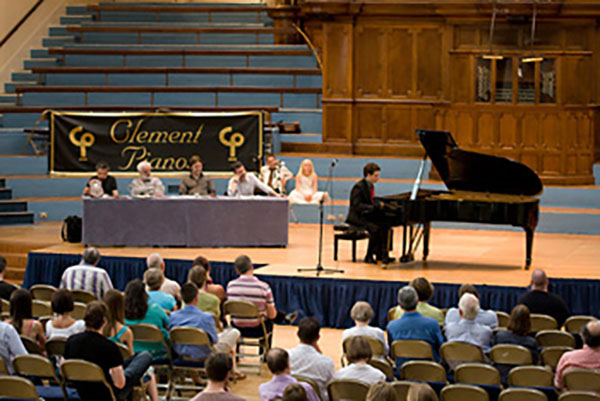
by Ian Mann
October 09, 2012
/ LIVE
Guest contributor Peter Coldham enjoys the final of the 3rd Nottingham International Jazz Piano Competition.
The Grand Final, Nottingham International Jazz Piano Competition, Albert Hall, Nottingham, 07/10/2012
It was a beautiful weekend to head up to the Midlands for the 3rd Nottingham International Jazz Piano Competition, amazingly, the only one in the world dedicated to the art of solo piano playing (apart from Montreux, which has had a category since 1999). This year’s has to have been the most successful yet, if nothing else because of the extremely high calibre of pianist that the event now attracts from all around the world. Judging as well as giving extra classes and workshops were four of the UK’s best jazz pianists and pedagogues: Tim Richards, Andrea Vicari, David Newton, and Jamil Sheriff, and this year’s competition featured competitors from Poland, the UK, Mauritius, Canada, Italy, Austria, and the USA. Entrants had to be under 30 to compete, and they went as young as 20. First prize was a Kawai grand piano worth £13,000 shipped to wherever you might happen to live.
The semifinals having taken place on the Friday and Saturday in the intimate surroundings of Clement Pianos, the competition’s creators and hosts, the Sunday afternoon finals, which took place in Nottingham’s Albert Hall (a magnificent former Methodist Mission), began with Nicolas Hetko from New York State, who is just 21 but has already played with such names as Dave Holland and Chris Potter. He had floored the audience in the semifinals with astonishing and masterful renditions of Shorter’s ‘Footprints’ and Corea’s ‘Spain’, which placed him firmly as a frontrunner for the prize and as a rising young talent. In his final programme, he followed up with a sophisticated original composition about the Northern Lights and a repertoire that hinted at a power far beyond his years.
Jeremy Siskind, 25 and also from New York, followed on, whose natural flow and intensely lyrical playing shone in the little-known but charming ballad ‘Too Young To Go Steady’, and he showed a great sense of poetry with some delicate, radiant playing in another ballad and composition, ‘Little Love’. He also displayed improvisational skill in that the pieces repeated from his semifinal programme had some significant differences in the finals. Siskind obviously has a thorough classical grounding, and this showed (as did a sense of humour) in his final selection, an eccentric rhapsody on, of all things, Michael Jackson’s ‘Black or White’ - which began as a sort of growling Beethoven chorale and later resounded with more impressionist harmonies, winding up a very strong programme with an entertaining romp.
Next up was Jerry Léonide, 28 and originally from Mauritius but now resident in Paris, with an impressive, lively and unusual programme that began with ‘The Two A’s’, an affectionate portrait of his two sisters (who presumably must be quite rambunctious!) involving some complex ostinato patterns in the left hand (which seem to be a feature of his playing), an exciting sense of perpetual motion, an original sense of structure. He followed on with a barnstorming approach to Coltrane’s ‘Countdown’ with a complete mastery of the demands and complexities of modal playing, which provided the highlight in what was obviously a very technically demanding programme of pieces from an accomplished player.
The last finalist, Angelo DiLoreto, having already had to follow on from Hetko earlier on in the semifinals, now again had the unenviable task of going last. Luckily, his was among the most sturdy, rich and mature playing in the competition. It’s hard to believe that this thoughtful musician (yet another American) is only 22 years old, given his remarkable treatment of the waltz ‘Emily’ in odd metre and with a complex accompaniment (betraying perhaps the influence of Fred Hersch, whom he has studied with), and a fragile, crystalline rendition of Ellington’s ‘Prelude to a Kiss’, both performed in the semifinals. His final repertoire included an oddly speculative version of Monk’s ‘Straight no Chaser’, and ended with a spirited and very personal take on Metheny’s ‘Minuano’.
The judges retired for about ten minutes or so, apparently their shortest deliberation yet, before returning a verdict that Jeremy Siskind had won the contest. They also justly awarded a special commendation to Nicholas Hetko for a stunning and intricate performance in the improvisation round (in which the judges demonstrate a three-note sequence to the competitor which they then have two minutes to freely improvise on, which was great fun). Siskind seemed in equal parts baffled and delighted.
The pianists, who all seemed to get along well and share a lot of respect for one another, all spoke of the inspiring and enriching experience the event had been, and although Siskind had clearly been exceptional, the semifinals were full of excellent players who could easily have made it through—I do hope for instance that more female players (there were apparently many in the first selection) make it into the competition next time. I came away thinking that Clement Pianos have done a fantastic job in creating what is now a prestigious international competition attracting world-class talent that we are lucky to have in here the UK and which deserves to be more well-known. Frankly, I can’t believe I have to sit around waiting two years for the next one.
The event was filmed and a CD is being issued of the finals performances by Clements Pianos, so watch the website (http://www.nijpc.com) or follow them on Twitter (@NIJPC2012) for more.
A world-class event but tragically underattended (certainly by anyone outside the Nottingham area!),
PETER COLDHAM
blog comments powered by Disqus